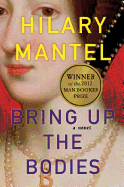
Tudor England during the reign of Henry VIII is a place readers have visited many times--but in the hands of Hilary Mantel, it becomes territory both new and unsettling. In Bring Up the Bodies, the sequel to the Booker Prize-winning Wolf Hall, Mantel weaves a richly textured world that is at once deeply foreign and entirely relevant, coalescing around the single thing that over centuries remains unchanged: the driving passions of people, even those who are kings. Through the eyes of Thomas Cromwell, a man of formidable intellect, the psychological and political complexities of the court are unraveled for inspection. And as ever, Mantel's virtuoso use of language is compelling.
Erotic desire and violent death are a constant, powerful undercurrent. In Wolf Hall, the king was driven by his desire for Anne to upend the churches of England; in Bring Up the Bodies, the whispers at court subtly insinuate sexual possibilities as everyone is preoccupied with Anne's body: watching for signs of pregnancy, listening for signs of adultery. In such a world--where sexuality is pervasive but seldom seen and death threatens even the most powerful--truth becomes inextricably entangled with imagination, and Cromwell fashions a reality in which Anne's adultery is suddenly plausible.
Here the downfall of Anne Boleyn is remade into a chilling suspense story. Thomas Cromwell orchestrates events that lead to Anne's death because otherwise, chances are good that she will do the same to him. --Ilana Teitelbaum, book reviewer at the Huffington Post
Read more about Bring Up the Bodies and Hilary Mantel in our Maximum Shelf.

